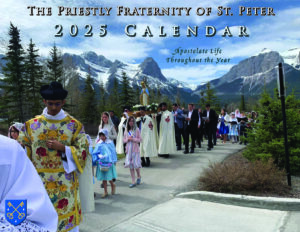Live Tomorrow! Fr. Daniel Heenan Interview w/TAN
TAN Books is currently featuring a series of interviews with various priests, including FSSP priests! The segments, part of TAN’s “Wisdom from Our Fathers” series, are being streamed live on TAN’s Youtube channel and are also available there for later viewing. Fr. Daniel Heenan, pastor of FSSP Guadalajara, will appear tomorrow, April 17th, at 12 noon EST.
Fr. Zachary Akers, the FSSP’s Director of Development, appeared yesterday, April 15th, discussing the topic of fallen-away Catholics, what we can do to keep our kids in the Faith, and how to talk to relatives and friends that have fallen away. Viewers also had a chance to “Ask Father” and submit questions that Fr. Akers answered on the air. See that video here!
Fr. Heenan will also be appearing on the show this Tuesday, April 21st and one week later on the 28th. +
April 16, 2020

Sound the Trumpet of Salvation
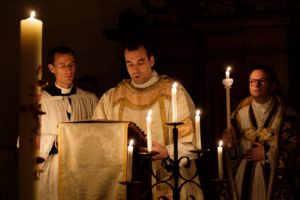
We at the Priestly Fraternity of St. Peter wish you a most blessed Easter! Today is the most glorious and joyful feast of the year, when the Church joins with all the angels and saints in exalting her risen Lord and declaring His victory over sin and death. The joy that is ours today is eloquently expressed in the first words of the Exsultet, the proclamation made by the Deacon during the Easter Vigil after the blessing and procession of the Paschal Candle, the symbol of the risen Christ:
Let the angelic choirs of Heaven now rejoice; let the divine mysteries rejoice; and let the trumpet of salvation sound forth the victory of so great a King. Let the earth also rejoice, made radiant by such splendor; and, enlightened with the brightness of the eternal King, let it know that the darkness of the whole world is scattered.
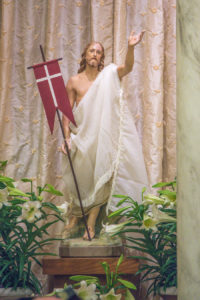
We invite you to join us via livestream for the liturgies of this glorious day. You can watch on LiveMass or on one of the many parish livestreams listed here. Or perhaps you have already joined us for the Vigil, a liturgy which is truly one of the most beautiful in the Church’s calendar. If you did not see it last night, many parishes keep their recordings posted on their channels for later viewing.
May the peace and joy of Our Risen Lord dwell in your hearts this day and always! +
April 12, 2020

Good Friday
What more ought I to have done for thee, that I have not done? I planted thee, indeed, My most beautiful vineyard: and thou hast become exceeding bitter to Me: for in My thirst thou gavest Me vinegar to drink: and with a lance thou hast pierced the side of thy Savior.
– the Third Reproach, sung during the Adoration of the Cross
Today is the most sorrowful and somber day of the year. On this day the Church recalls the Death of her Lord and Savior Jesus Christ, Who sacrificed Himself on the altar of the Cross for the sake of us sinners. It is difficult to know what to write or what to say on this day, but silent adoration is, perhaps, the most profound homage we can give to our crucified King, and the Church moreover guides us through the solemn hours of Good Friday by means of its beautiful liturgy.
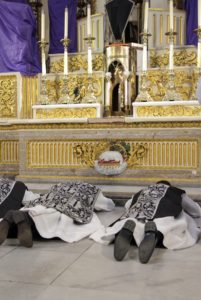
Most parishes preface today’s ceremonies with the praying of the Stations of the Cross earlier in the day. The Solemn Afternoon Liturgy usually begins at 3pm, the hour of Our Lord’s Death, and is divided into four parts. The first features readings from the Old Testament foretelling the future Messiah, including the passage from Exodus containing instructions for the sacrifice of the Passover lamb before the Israelites’ flight from Egypt. The lamb is a clear figure of the future Paschal Lamb Who will be sacrificed for sinners, and Whose Blood will save us from God’s wrath. Having heard the first three Passion accounts earlier in Holy Week, we then listen to that of St. John, the lone Apostle to accompany Our Lord to the foot of the Cross and to witness today’s events.
The second part is the Great Intercessions, prayers of ancient origin that the priest and the people offer to God for all the needs of the Church and the world. The third part is the Adoration of the Cross; the statues and crucifixes in the church having been veiled since Passion Sunday, the crucifix is uncovered and adored in stages before being venerated by all present. The choir sings at this time the Improperia, the Reproaches, a series of piercing lamentations for the bitterness that God received from His people in return for His love and care for them. The video above shows the Adoration of the Cross and other moments from the pre-1955 Good Friday liturgy at Santissima Trinità dei Pellegrini, our parish in Rome, in 2018.
The fourth part is called, in the 1962 Missal, the Communion of the Priest and the People; in the pre-1955 Holy Week, it is called the Mass of the Presanctified. In both cases the Mass is not a Mass proper since it lacks a Consecration, the hosts for Communion being taken from those reserved from Holy Thursday. In the newer rubrics, both the priest and people receive; in the pre-1955, only the priest.
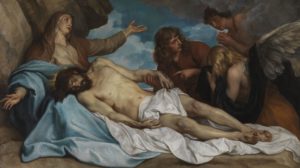
Of course, our minds, both limited in capacity and hampered by sin, inevitably have a hard time sounding the depths of these mysteries. The sorrow that we feel is always inadequate when we consider the scale of the tragedy, that mankind should kill its own God. Our gratitude falls flat when faced with the knowledge that Christ bore these sufferings to save us and to show us how much He loves us. How little we have to give, it seems! But the Mother of Sorrows is with us as we pray and meditate today. It was, in fact, as He hung upon the Cross that Christ gave her to us as our Mother, and St. John stood for all of us when he accepted her as his own. Let us ask this Mother, then, to allow us some part in her sorrow, and to fill us with an everlasting remembrance of everything her Son did for us. +
Follow all the liturgies of the Sacred Triduum on LiveMass, or on the streaming sites of the many FSSP apostolates live-broadcasting their ceremonies.
April 10, 2020

In Cœna Dómini
Before the festival day of the Pasch, Jesus knowing that His hour was come, that He should pass out of this world to the Father, having loved His own who were in the world, He loved them unto the end.
– John 13:1, from the Gospel for Holy Thursday
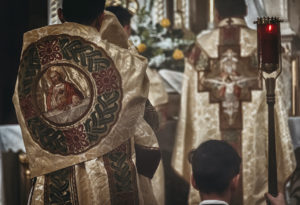
Today is Holy Thursday. This evening marks the beginning of the holiest time of the year, the Sacred Triduum, in which we commemorate the Passion, Death and Resurrection of Our Lord Jesus Christ. On this day we especially recall the institution of the Holy Eucharist and the Sacred Priesthood, when Our Lord celebrated the first Mass and gave His Apostles and their successors the power to transform ordinary bread and wine into His own Body and Blood.
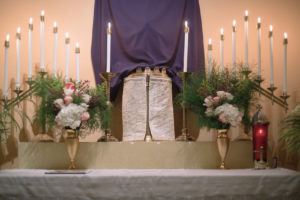
After the Gloria of today’s Mass, the bells and organ fall silent until the Easter Vigil, as the Church enters into a time of profound sorrow for the sufferings of her Divine Spouse. As Our Lord allowed Himself to be taken away on the first Holy Thursday, so does He gradually withdraw from us today: the Blessed Sacrament is removed from the high altar after Mass and taken in procession to the Altar of Repose, and the other altars stripped of all decoration.

Though many of us will be without the Holy Eucharist today, and have indeed been suffering separation from Our Lord for some time now, the restrictions of the coronavirus have given us an opportunity to reflect on just what a gift the Blessed Sacrament is. When we have daily access to Holy Mass, it is easy to take for granted Who it is that comes to us every time we kneel at the altar rail. What an extraordinary, incomprehensible thing that He should choose to remain with us in such a lowly form, to entrust Himself to our sinful hearts that we might partake of His Divine Life! As St. John Vianney once said, “If we really understood the Mass, we would die of joy.”
So let us thank Our Lord today for the profound gift of the Mass, the Blessed Sacrament, and the Holy Priesthood through which He comes to our altars. May our love for Our Eucharistic Lord grow ever stronger and deeper as we venerate Him from afar and steadfastly await His return. +
Follow all the liturgies of the Sacred Triduum on LiveMass, or on the streaming sites of the many FSSP apostolates live-broadcasting their ceremonies.
April 9, 2020

30+ FSSP Apostolates to Livestream Triduum
As we wait and pray for an end to the coronavirus pandemic, many of us will rely on livestreaming as a way to participate in the upcoming liturgies of the Sacred Triduum. LiveMass has been a helpful hub for many of you in recent weeks, our online apostolate bringing you regular livestreams from five of our apostolates. And now, with the St. Corona Project in place, LiveMass also offers livestreams from seven locations not on its usual schedule: Our Lady of Guadalupe Seminary, FSSP Coeur d’Alene, FSSP Dayton, FSSP Little Rock, FSSP Rapid City and two of our international apostolates.
That’s already 12 Fraternity livestreams. But did you know there are even more? That’s right. Many parishes are producing their own livestreams, and we have been amazed at how the Fraternity world has suddenly become a bit smaller as accessible streams pop up all over the District. We’ve compiled a comprehensive list of all those in the North American District below, complete with links. We invite you to take a cross-country – a cross-continent – tour of the liturgies of Holy Week, and perhaps it will be a pleasant introduction to parishes and apostolates you’ve never met before. Altogether, there are 30 streams! Actually, there are 31, because we happened to find out that our apostolate in Lyon, France – featured on your Fraternity calendar this month – is also livestreaming from its Youtube channel! And our apostolate in Kraków, Poland is streaming the pre-1955 Triduum on its channel…well, there are probably more but we can’t list them all!
We wish you a blessed and holy Triduum! +
FSSP Baltimore – The National Shrine of St. Alphonsus Liguori, offering the Holy Week liturgies: https://www.youtube.com/channel/UCItp3GIpTS67DvqOLuWuWig
FSSP Chesapeake – St. Benedict Parish, offering daily Mass and the Holy Week liturgies:
https://www.facebook.com/StBenedictsParish/live
FSSP Dallas – Mater Dei Parish, offering daily Mass, the Holy Week liturgies and other devotions: https://www.youtube.com/channel/UC79ktoYUSocT2Bdt_LVnPLQ
FSSP Denver – Our Lady of Mount Carmel Parish, offering the Triduum liturgies and Tenebrae:
https://www.olmcfssp.org/index.php/olmc/post/holy_week_live_stream
FSSP Harrisburg – Mater Dei Latin Mass Community, offering the Holy Week liturgies, Tenebrae, devotions and talks:
https://www.facebook.com/materdeipa/live
FSSP Houston – Regina Caeli Parish, offering daily Mass and the Holy Week liturgies:
https://www.facebook.com/reginacaeliparish/live
FSSP Joliet – St. Joseph Parish, offering daily Mass and potentially the Triduum liturgies: https://venue.streamspot.com/a98d61a9
FSSP Lincoln – St. Francis of Assisi Chapel, offering Sunday Mass and the Holy Week liturgies: https://www.facebook.com/StFrancisLincoln/live
FSSP Nashua – St. Stanislaus Parish, offering daily Mass, Tenebrae on Wednesday and the Holy Week liturgies:
https://www.latinmassnashua.org/live
FSSP Ottawa – St. Clement Parish, offering the Holy Week liturgies: https://www.youtube.com/channel/UC-k7cYplIu_EGCi7iKsLwig
FSSP Pequannock – Our Lady of Fatima Chapel, offering daily Mass, Tenebrae and the Holy Week liturgies:
https://www.youtube.com/channel/UCvjC3Rw7R4q4OtMPvKiBcnA
FSSP Phoenix – Mater Misericordiae Mission, offering daily Mass and the Holy Week liturgies: https://www.facebook.com/MaterMisericordiaePhoenix/live
FSSP Providence – St. Mary’s Church on Broadway, offering daily Mass, Divine Office, Tenebrae and the pre-1955 Holy Week liturgies: https://www.youtube.com/channel/UCKyyBg-7STnPDO_-oEQWY0g
FSSP Richmond – St. Joseph Parish, offering daily Mass and the Holy Week liturgies:
https://www.youtube.com/channel/UCrQvMYTBEZG7YkDhxVf1Ong
FSSP Sacramento – St. Stephen the First Martyr Parish, offering the pre-1955 Holy Week liturgies and talks:
https://www.youtube.com/c/FSSPSacramento
FSSP Seattle – North American Martyrs Parish, offering daily Mass, Stations of the Cross, Rosary, Divine Office and the pre-1955 Holy Week liturgies: https://vimeo.com/northamericanmartyrs
FSSP Tacoma – St. Joseph Parish, offering the Holy Week liturgies and other Lenten events: https://www.youtube.com/channel/UCGphbd3fgXviaxp5DjscYkw
FSSP Vancouver – Holy Family Parish, offering daily Mass and the Holy Week liturgies: https://www.facebook.com/HolyFamilyParishVancouver/live
April 8, 2020

Tuesday in Holy Week
To-day, again, our Saviour sets out in the morning for Jerusalem. His intention is to repair to the temple, and continue His yesterday’s teachings. It is evident that His mission on earth is fast drawing to its close. He says to His disciples: ‘You know that after two days shall be the Pasch, and the Son of Man shall be delivered up to be crucified.’
– from the Tuesday in Holy Week in The Liturgical Year by Dom Guéranger
Read Dom Guéranger’s full entry for today here on the website of St. Francis de Sales Parish, our apostolate in Atlanta. The parish is digitizing The Liturgical Year and sends out every entry to subscribers via email, free of charge. If you’d like to subscribe, you can do so here, and you can livestream the liturgies of Holy Week on LiveMass. +
April 7, 2020

Meditations to Accompany You Through Holy Week
The ancient and mysterious ceremonies of the Church’s Holy Week merit a great deal of time for preparation and prayer. Those confined to their homes due to the coronavirus in this exceptional year will be consoled by the detailed descriptions provided by Dom Prosper Guéranger, the 19th C. abbot who re-established the Benedictine monastery at Solesmes, France. As featured here before, St. Francis de Sales Parish, our apostolate in Atlanta, has been digitizing his 15-volume series The Liturgical Year and making it available via email for those who would like to receive every entry in their inboxes (subscribe here: https://fsspatl.com/email-subscription). We will be posting links to the Holy Week entries throughout the coming days.
Dom Guéranger’s work includes descriptions, along with the Latin liturgical texts and translations into English, of many special parts of this most important week in the year. It is important to note that he describes the ceremonies that were celebrated by the Church before the changes to the Holy Week liturgies in the 1950s. Many FSSP apostolates have received special permission from the Holy See to use the older ceremonies.
We will begin our meditations today, with Dom Guéranger’s entry for the Monday in Holy Week.
This morning, also, Jesus goes with His disciples to Jerusalem. He is fasting, for the Gospel tells us that He was hungry, He approaches a fig-tree, which is by the way-side; but finds nothing on it, save leaves only. Jesus, wishing to give us an instruction, curses the fig-tree, which immediately withers away. He would hereby teach us what they are to expect, who have nothing but good desires, and never produce in themselves the fruit of a real conversion. Nor is the allusion to Jerusalem less evident. This city is zealous for the exterior of divine worship; but her heart is hard and obstinate, and she is plotting, at this very hour, the death of the Son of God.
You can read the rest of today’s entry here, and livestream the liturgies of Holy Week on LiveMass. +
April 6, 2020

Hosánna Fílio David
Hosánna fílio David: benedíctus, qui venit in nómine Dómini.
Hosanna to the Son of David: blessed is He Who cometh in the Name of the Lord.
Antiphon for the Blessing of Palms
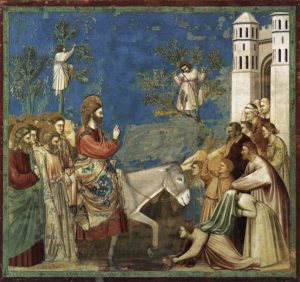
Today is Palm Sunday, the beginning of Holy Week. On this day Our Lord enters triumphantly into Jerusalem, welcomed as a King by the crowds that lay cloaks and palm branches in His path and hail Him as the royal Son of David. It seems at last the jealous conniving of the scribes and Pharisees has been silenced, and that He is receiving the praise and recognition He deserves.
But only a few days later He will stand in chains in the court of Pilate while the crowds demand the release of a criminal. Now he is greeted with smiles and joyful cries of Hosánna, but soon He will be jeered and scorned with cries of “Crucify Him, crucify Him!” He will soon trade this regal reception for a crown of thorns, this royal road into the holy city for the Via Dolorosa that will take Him outside the city, to Golgotha where He will be executed as an outcast of the people. So many stand by Him now, but so few will stand by Him on Good Friday.
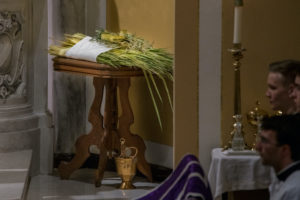
We might feel especially sorrowful this Holy Week, as most of us will spend the sacred hours of the Triduum without its beautiful liturgies. As we watch the ceremonies livestreamed from afar and cannot participate in the same way we usually do, we may feel like we are not accompanying our King. But nothing could be further from the truth. We are simply accompanying Him in a different way, in some respects a deeper way which, if we allow it, will draw us even closer to Him. He is allowing us to accompany Him in His solitude, for He Himself faced this time alone, deprived of friends, supporters, consolations. The only ones who stayed with Him were those closest to Him: His Mother, St. John, St. Mary Magdalene. Let us, then, not become despondent, angry or frustrated, things that put us so far from Our Lord, but let us be counted among those closest to Him, those who followed Him down the longest road, those who loved Him to the end. +
Follow the liturgies of Holy Week live at LiveMass.
April 5, 2020

Good News from Wigratzbad!
Thank you all for your prayers on behalf of the priests and seminarians at our Wigratzbad seminary, which was hit hard with the coronavirus at the beginning of March. We are happy to report that, though the quarantine remains in effect, everyone is out of the hospital and only a few are still seriously ill. Work and classes are resuming and seminary life is gradually returning to normal.
In announcing the mostly-good health of the residents, the seminary wrote on its website:
We thank the Lord for having saved us from the most serious consequences of the disease, and we obviously remain sensitive to the distress which now affects the whole world. With you, we pray for the sick, and especially the dying, as well as for the nursing staff and all those who dedicate themselves generously in these difficult times.
With the seminary we give thanks to God for these developments. Please keep in your prayers those who are still sick, all who are suffering from this virus and those working to care for them. +
April 3, 2020

Spiritual Communion and the Fruits of the Mass
The following article was published for the benefit of his parishioners by one of our new priests, Fr. William Rock, assistant pastor at Mater Misericordiae Mission, our apostolate in Phoenix, AZ. With so many of you unable to attend Mass at present, we thought it an excellent thing to share with you, so that you might know the great benefits of the many Spiritual Communions you are making and of the private Masses that our priests are offering for your intentions.
Spiritual Communion and the Fruits of the Mass
by Fr. William Rock, FSSP
In this troubling time, you should know that God and His Church have not abandoned you. Even with the prohibition of public Mass and Communion Services, there are still many sources of grace which are open to you. I would like to discuss two of them here – Spiritual Communions and the General Fruits of the Mass.
Following the teachings of the Catechism of the Council of Trent(1), also known as the Roman Catechism, there are three ways in which one can receive Communion: (1) Sacramentally-only; (2) Sacramentally-and-Spiritually; and (3) Spiritually-only.
Those who receive Communion while knowing they are in a state of Mortal Sin are said to receive Sacramentally-only. This is because, while they truly receive the Body, Blood, Soul, and Divinity of Christ under the appearances of bread and wine, they do not receive any spiritual benefits. On the contrary, they incur an additional sin.
Those who receive Communion Sacramentally-and-Spiritually receive the Body, Blood, Soul, and Divinity of Christ under the appearances of bread and wine and do receive spiritual benefits.
Those who receive Communion Spiritually-only receive the spiritual benefits of Communion without receiving the Body, Blood, Soul, and Divinity of Christ under the appearances of bread and wine.
The Catechism goes on to explain that those who receive Spiritually-only “are those who, inflamed with a lively faith which worketh by charity (Gal. 5:6), partake in, wish and desire of that celestial bread.” There are several things that should be noted from this passage.
The first is that in order to receive Spiritually-only, one must be in a state of grace, as the theological virtue of charity and Sanctifying Grace always exist together. So, one must have Sanctifying Grace, or be in a state of grace, in order to make a Spiritual Communion. If you are not in a state of grace, receive sacramental absolution as soon as you can (and be praying Acts of Contrition in the meantime). Editor’s Note: Even in the absence of public Masses, many parishes are still offering Confessions. Check with your parish for details.
Next, it is important to note that a Spiritual Communion must include a wish and desire to receive Sacramentally-and-Spiritually even though such a reception at the current time is not possible. It would be enough, then, when beginning to make a Spiritual Communion to pray, “Lord, I wish to receive You in a sacramental and fruitful Communion, but, as I can’t right now, I wish to receive You spiritually,” and then continue to pray as you would when receiving Sacramentally-and-Spiritually. There are prayers which are recommended by the Church for making a Spiritual Communion (Editor’s Note: St. Alphonsus Liguori’s version is included at the end). They do not necessarily need to be used, and one can draw phrases and ideas from them, based on one’s own dispositions, to prepare one’s own.
Spiritual Communions can be made at any time during the day or night, and as many times as one wants. One does not need to be in a church, in front of the Tabernacle, or even in front of a holy image. Spiritual Communions can be made anywhere, although clearly, it would be unfitting to make them in places ill-suited for virtue.
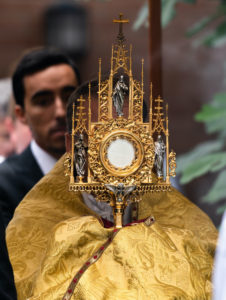
We should not worry that our sanctification is in some way impeded by receiving Spiritually-only and not Sacramentally-and-Spiritually during this time. As the Catechism states, those who receive Spiritually-only “receive, if not the entire [spiritual benefit of a Sacramental-and-Spiritual Communion], at least very great fruits.” So, the graces received from Spiritual-only Communions can be as great as the graces received in a Sacramental-and-Spiritual Communion.
But, in order to receive as many graces and fruits from a Spiritual Communion as one can, or even from a Sacramental-and-Spiritual Communion, one must be properly disposed. The better disposed one is, the more graces one is able to receive. To properly dispose oneself, one should pray preparatory prayers before receiving Sacramentally-and-Spiritually. These prayers can be found in hand Missals and elsewhere, or one could pray using one’s own words. How long one should spend praying such prayers will depend on the other duties one has to fulfill. This is why it is important to arrive with time before the start of Mass so that one can pray these prayers, if one is planning on receiving (remember that one is only required to receive Communion sacramentally once a year from the First Sunday of Lent to Trinity Sunday in these United States). One could also pray these prayers at home before departing for the church if doing them at the church would be difficult. To make a Spiritual Communion fruitful, one should dispose oneself in the same manner, adjusting the texts of the prayers as necessary. Preparations before receiving either Sacramentally-and-Spiritually or Spiritually-only should include some form of an Act of Contrition.
We know, however, that we attend Mass for more than just receiving Communion. When we attend Mass, we give God the worship due to Him as our Creator and our Redeemer by offering up to Him in an unbloody manner the bloody Sacrifice of Christ on the Cross. The two-fold Consecration of the bread and wine makes the Sacrifice of the Cross sacramentally present. As Christ’s Sacrifice is present, the fruits from that Sacrifice are made available to the faithful. These fruits are placed in four groups – (1) Ministerial Fruits, (2) Very Special Fruits, (3) Special Fruits, and (4) General Fruits.
The Ministerial Fruits are those fruits which are offered to those on whose behalf the Priest is celebrating the Mass. The intention listed in the bulletin for the Mass, for example, would be the recipient of these fruits (if the intention is one who can receive them).
The Very Special Fruits are those which are offered to the celebrating Priest Himself. As he is offering the Sacrifice of the Mass in persona Christi for others and for himself, these fruits are made available to him.
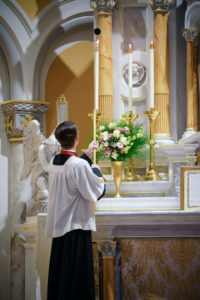
The Special Fruits are those offered to those who are cooperating in offering up the Sacrifice of the Mass by any external act (besides the Priest). This cooperation includes being physically present at Mass, but also by contributing materially to the celebration of the Mass. Those who have donated flowers, candles, vestments, liturgical vessels, and other such things being used in a Mass – including the church building itself – are all offered Special Fruits from that Mass. The amount of fruit offered to each is proportional “to their closeness of cooperation”(2) to the Sacrifice. So, the Altar Server in the Sanctuary will be offered more Special Fruits than that which will be offered to those in the pews.
Note, however, that there is a difference between the fruits being offered and the fruits received. The amount that is received is dependent upon one’s disposition. So, while the Altar Server might be offered more fruits, he may receive less than some in the pews as they, while offered less, were better disposed and thus actually received more than the Server. This is why, again, prayers of preparation before Mass are so important, not just for the reception of Communion, but also for receiving the fruits that will be made available and for worthily offering the Sacrifice of the Mass through the hands of the Priest.
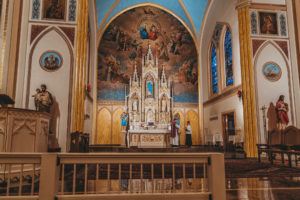
Lastly there are the General Fruits. These fruits are offered to all members of the Church, and even to those outside of the Church for their conversion. In order to gain these fruits, again, one must be properly disposed. This is why morning prayers and offerings are so important and why one should include in one’s morning prayers words to the effect of “Lord, during the course of this day, bestow upon me any Indulgences whose requirements I may fulfill and all fruits available to me flowing from all of the Masses said throughout the world today.” As Masses will continue to be said privately during this time, you should avail yourselves of these General Fruits which are produced. Additionally, if you feel that you qualify for Special Fruits due to any contributions you may have made, be sure to ask for those fruits also.
Hopefully you are able to see that the practices explained above are not to be used only during this unhappy time. These lessons should be integrated into the spiritual life of every Christian so that each may draw from all of the abundant sources of grace available to him. +
Spiritual Communion by St. Alphonsus Liguori:
My Jesus, I believe that You are present in the most Blessed Sacrament. I love You above all things and I desire to receive You into my soul. Since I cannot now receive You sacramentally, come at least spiritually into my heart. I embrace You as if You were already there, and unite myself wholly to You. Never permit me to be separated from You. Amen.
(1) Part II: The Sacraments – The Eucharist
(2) O’Connell, The Celebration of the Mass (1964), p. 39, n. 6.
March 31, 2020








